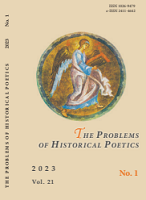Концепт "Яблочного Спаса" в романе И. С. Шмелева "Лето Господне"
The Concept of the “Apple Savior” in the Novel by I. S. Shmelev “The Summer of the Lord”
Author(s): Elena Yu. ShestakovaSubject(s): Studies of Literature, Russian Literature
Published by: Петрозаводский государственный университет
Keywords: concept; the Apple Savior; Summer of the Lord; the childhood theme; Ivan Sergeevich Shmelev; the motherland theme; the image of Moscow; the motif of memories; discourse; symbol;
Summary/Abstract: The research study aims to reveal the ways in which the concept of “Apple Savior” is artistic embodiment in the novel by I. S. Shmelev “The Summer of the Lord.” The concept of “Apple Savior” is considered in the context of the writer’s value and semantic attitudes, which have undergone significant changes compared to his pre-Revolution creative period. In the author’s artistic consciousness, the image of the garden appears as the metaphorical source and beginning of human life. The narrative structure of the chapter is two-dimensional: it contains the discourse of the child hero and the mature narrator. Within the framework of children’s worldview, the image of the garden is inseparable from the image of the family house, the categories of love, beauty and God’s grace. The image of the garden is connected with the idea of Moscow as a garden and Holy Russia as a garden. In the novel “The Summer of the Lord” there is a generalized image — a symbol of the world transformed by God’s presence and the power of the author’s grateful love. The theme of transfiguration closely approaches the motifs of return and memories, which acquire a pronounced nostalgic tinge and lyrical tonality. The images of temples, the city of Moscow and Russia are associated with the motifs of transfiguration, sacralisation, spirituality, deification and eternity. In recreating the concept of the “Apple Savior” by I. S. Shmelev, the artistic method of “spiritual realism” fully manifested itself. The chronotope of the real world in the novel “The Summer of the Lord” appears in close connection with the existential sphere, is comprehended by God’s world. The theme of memory and grateful love establishes the discourse of a mature narrator. The world of childhood and Homeland is recognized as a lost biblical paradise, and becomes the subject of persistent thoughts and reflections of the author.
Journal: Проблемы исторической поэтики
- Issue Year: 21/2023
- Issue No: 1
- Page Range: 184-201
- Page Count: 18
- Language: Russian

